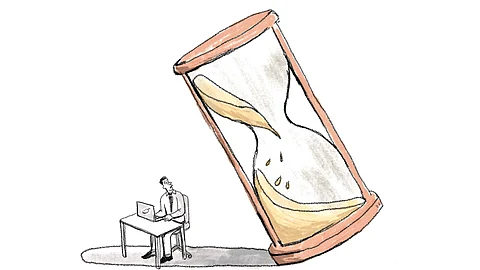
- NEWS
- the EDIT
- COMMENTARY
- BUSINESS
- LIFE
- SHOW
- ACTION
- GLOBAL GOALS
- SNAPS
- DYARYO TIRADA
- MORE

The truth is, no one can tell us a timeline.
When we were kids, a timeline wasn’t a thing. Or if it was, it was all about how many weeks were left of our summer break or how many math classes had to pass before Christmas vacation. But growing up, and becoming aware of what life has to offer for those who chase abundance, rushing toward that “abundance” became the new norm.
At 21, I believed I had it all mapped out: take an MBA, show up at the office every day, drink black coffee at 3 p.m., reconcile my passion for writing and piano, get married, have kids, and live as long as possible. Everything was planned in sequence — each with its own timeline. But I’ve never been one to wait passively for the next leaf to turn. Fast, if possible. Simultaneous, if I can. The world waits for no one. The slow get left behind, and slots are limited.
That mindset served me well. By 25, I became a manager, an uncommon feat in my industry. At 26, I earned my MBA and began teaching. At 27, I founded a watch company. By 28, I had appeared live on CNN Philippines and was featured in major publications. At 29, I got engaged. I am living beyond what I thought was possible for someone who flunked too many times in school, someone whom others saw as average. And I thought I was happy. I felt grateful, yet strangely ungrateful. I wanted more. I didn’t get here just to stop here.
A new decade looms, and I’m still hurrying. But toward what, exactly?
Then came the phone call.
It was a gloomy afternoon at work, the kind where everything feels pressing and nothing feels urgent — until it does. My fiancée’s voice trembled on the other end of the line. Her mother, Tita Anchet, was diagnosed again. Cancer. The aggressive kind.
Suddenly, the urgency of my to-do list collapsed. My grip on ambition loosened. Everything narrowed down to that moment, that voice.
“It’s the aggressive type,” she said.
I tried to sound reassuring. “Everything will be okay,” I told her. Not because I believed it medically, but because I needed her to believe it emotionally. Ironically, I’m not one to rely on hope. Logic usually made more sense. But in that moment, logic failed me.
Yet even then, Tita Anchet carried herself with unwavering grace. And in the months that followed, something remarkable happened — she responded to the treatment in ways her doctors now call one of the best recoveries they’ve seen. She didn’t just survive; she lived through it with joy, clarity, and presence.
She was no stranger to pausing for life’s small, quiet moments. She always had been that way. She said thank you often, offered hugs freely and expressed love generously. It was no surprise that, when her diagnosis was made known, prayers and support poured in. She is deeply loved. She lived — and continues to live — with purpose.
And I, who thought I was racing time, became aware not only of her mortality, but my own.
We tend to live for the future, as if it’s promised. But in doing so, we forget the present. We float. We skim. We rush from milestone to milestone, believing that life is best lived at 180 kph. But speed is not the measure of meaning.
Somewhere along the way, I mistook movement for momentum, and milestones for meaning. At each checkpoint — promotion, degree, feature, company launch — I expected fulfillment. But the higher I climbed, the more disoriented I felt. At the peak of every accomplishment was an echo of emptiness.
And worse, I realized what I traded for those peaks: dinners with friends, unhurried time with my parents, the warmth of shared silence in a family gathering. All sacrificed for the hustle.
Everything is a trade, especially time.
I often tell myself I had no choice. That competition is fierce, and standing still is falling behind. But lately I wonder, who am I really racing? Is it the world? Or is it just me, chasing a version of success scripted by social media, shaped by norms, and directed by fear?
Facing Tita’s diagnosis didn’t just pause the race, it rewrote the course.
Because when we’re reminded of our mortality, we reflect. We look back. We ask: Have I lived well? Did I say enough thank yous? Did I express enough love? Did I hug tightly enough, or often enough? Was I there when it mattered?
When we’re faced with the possibility of an ending, we start noticing everything: the way light falls through the window, the comfort of shared meals, the importance of stillness.
And Tita — graceful, strong, and full of life — reminds us why our days are numbered. It’s so we learn to make each one precious.
I’m turning 30. And in no time, I’ll be 40. Then 50. The question isn’t how long I’ve got left — it’s what I’ll do with the time I know I have.
Great ambitions still fuel me. So does the drive to build, to achieve, to impact. But these days, I try to pursue those things without losing the present. I remind myself: no two laughs are the same. No two moments ever repeat. What’s in front of us is the only version we will ever have.
So how long have I got left?
I don’t know. No one does. And that, perhaps, is the greatest gift.
***
Ivan Jeff C. Soberano, entrepreneur and educator, took up BS Electrical Engineering at the University of Santo Tomas and a Master in Business Administration at the Ateneo Graduate School of Business.
